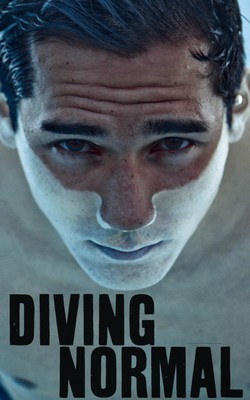
CREATIVE TEAM SWIMS BEAUTIFULLY, BUT SCRIPT TAKES A DIVE
SPOILER ALERT: THIS REVIEW CONTAINS INFORMATION THAT MAY SPOIL YOUR EXPERIENCE IF YOU PLAN TO SEE IT
After a particularly challenging conversation with my theatre companion, it became clear that neither one of us could figure out why a play with so much potential could leave us with nothing but questions. Instead of being excited about the issues raised in the show, such as love, loneliness, and longing, we found ourselves numb and frustrated. How is that possible? Diving Normal had such witty and intriguing dialogue, a fascinating premise, quirky characters and one of my favorite performances of the year so far.
Nothing frustrates this reviewer more than the feeling after a show that can be summed up with, “I just didn’t get it.” Help me out here.
 Lights up on the New York apartment of Fulton, an up-and-coming graphic novelist, as he tends to a wound of high school crush, Dana, who has been attacked, she says, by a homeless woman and called him for help. We learn immediately that she is a table-dancing, pill-popping, nervous wreck with a body that shows signs of recent, almost ritualistic abuse. Immediately, it is clear that she is paranoid and a liar. But she’s hot. So Fulton invites her to spend the night, even though it’s obvious, at least to us, that this girl is nothin’ but trouble.
Lights up on the New York apartment of Fulton, an up-and-coming graphic novelist, as he tends to a wound of high school crush, Dana, who has been attacked, she says, by a homeless woman and called him for help. We learn immediately that she is a table-dancing, pill-popping, nervous wreck with a body that shows signs of recent, almost ritualistic abuse. Immediately, it is clear that she is paranoid and a liar. But she’s hot. So Fulton invites her to spend the night, even though it’s obvious, at least to us, that this girl is nothin’ but trouble.
Next morning, she is awakened by Fulton’s friend and next door neighbor Gordon (one of the most interestingly drawn characters in recent memory). Dana likes Gordon and takes him up on the offer to watch him every Sunday at his dive practice at the YMCA. The triad begins. Dana becomes Fulton’s boyfriend and starts shacking up with him on the weekends. During the week, she heads back to Brewster to take care of her mom, who is now in a wheelchair because of an accident involving Dana behind the wheel. End Act One.
 When Fulton heads off to Los Angeles for a wedding and a hopeful reunion with a runaway father, the mildly retarded (we assume) Gordon, who up to now has been sweet, quirky, outspoken, and obsessive, decides to declare his love for Dana after finding out her secret: she gets off on abuse during sex and has been sleeping with another man while with Fulton. Gordon chokes her, she gets turned on and they hit the sack.
When Fulton heads off to Los Angeles for a wedding and a hopeful reunion with a runaway father, the mildly retarded (we assume) Gordon, who up to now has been sweet, quirky, outspoken, and obsessive, decides to declare his love for Dana after finding out her secret: she gets off on abuse during sex and has been sleeping with another man while with Fulton. Gordon chokes her, she gets turned on and they hit the sack.
Fulton returns from L.A. and, rightfully enraged that his best friend and girlfriend just had sex in HIS bed, kicks the two out of his apartment. The curtain goes down on Fulton as he listens to Gordon, who is outside the door, inviting Fulton to share breakfast with him and Dana. End Act Two.
Wait, where’s the third act? That’s it?
OK, interesting story, right? But it seems unsettling for no reason. Why in the world would playwright Ashlin Halfnight take us on this harrowing journey? Why introduce all of those unresolved subplots: the dad, the ex-girlfriend, the mom? What is the appeal of Dana, the morphine-addicted masochist? There’s virtually no chemistry between Dana and Fulton (it seems almost excruciating for her to say, “I love you”) so why should we care if they end up together or not?
Halfnight is not to be disregarded, however. It is clear that he is a promising playwright, with a penchant for crackling dialogue and interesting characters. But the framework of the piece becomes insufferable towards the end. Halfnight seems like he’s trying to be too clever, dropping clues like breadcrumbs in a dark forest that lead nowhere; there’s no moral, no redemption to his tale.
 In fact, at one point Gordon mentions that he gave up church to dive on Sundays – it’s one of those lines that sticks in your head. Once he wraps his fingers around Dana’s neck at the end, I thought, did that ‘church line’ mean that Gordon abandoned his faith, so now it’s OK to choke a chick and screw her so that you can win her love? Is S & M his new religion? I don’t get it.
In fact, at one point Gordon mentions that he gave up church to dive on Sundays – it’s one of those lines that sticks in your head. Once he wraps his fingers around Dana’s neck at the end, I thought, did that ‘church line’ mean that Gordon abandoned his faith, so now it’s OK to choke a chick and screw her so that you can win her love? Is S & M his new religion? I don’t get it.
I suppose there are emancipations for some of the characters (Dana comes clean and Gordon comes out of his shell), but they are ultimately ugly and unforgivable to us (Dana is a sex fiend with no sense of consequences and Gordon lies to his best friend about having sex with Dana). The final moment is rightfully heartbreaking, but it is ugly, too: we see unfortunate, sad Fulton sitting on his couch contemplating a reunion with these losers, which makes him a loser, too.
I tell you, I simply don’t get it.
 What I do get is Scotty Crowe as Gordon. If you’re willing to put up with a second act that goes nowhere (and, let’s face it, you won’t be bored), Mr. Crowe is thrilling to watch because you can actually see the internal machinery working: the lonely, brilliant outcast who struggles to relate to people, combined with the child who is still testing the boundaries of relationships. A fascinating performance.
What I do get is Scotty Crowe as Gordon. If you’re willing to put up with a second act that goes nowhere (and, let’s face it, you won’t be bored), Mr. Crowe is thrilling to watch because you can actually see the internal machinery working: the lonely, brilliant outcast who struggles to relate to people, combined with the child who is still testing the boundaries of relationships. A fascinating performance.
Sexy Philipp Karner does a splendid job as Fulton; when he is betrayed, you will sense it from the depths of his soul. Unfortunately, his character is the odd man out in this trio of twenty-somethings (he’s relatively normal), and he’s left to react more than provoke; but his reactions are organic and believable, because he listens to his fellow actors as if hearing them for the first time.
Lovely and sincere Carly Pope manages to hold our attention, but she has some habits that get in the way of her achieving authenticity as Dana. There is a tendency to anticipate lines, and her movements seem mannered – there is a lot of thigh slapping, sighing, and unmotivated gestures. Did director Neil H. Weiss tell her that someone with a drug habit would act like that? It seems that the more interesting choice would be, like a drunk, trying not to act like she’s on drugs.
 Weiss has achieved much more than this script gives us; his actors have clearly worked hard on the way they relate to each other, and all of them have found great comedic moments within the drama. Weiss’ technical team also scored well: the wistful original music by The Newton Brothers, David Raines’ sound, and most especially, the graphic novel artwork that hangs in Fulton’s apartment by Leeahd Goldberg are astounding.
Weiss has achieved much more than this script gives us; his actors have clearly worked hard on the way they relate to each other, and all of them have found great comedic moments within the drama. Weiss’ technical team also scored well: the wistful original music by The Newton Brothers, David Raines’ sound, and most especially, the graphic novel artwork that hangs in Fulton’s apartment by Leeahd Goldberg are astounding.
Diving Normal may be entertaining and provocative, but it’s like dating someone you really like, the sex is hot, and then, suddenly, that person turns into a mystifying psycho from hell. It’s up to you to choose if the sex is worth it.
tonyfrankel @ stageandcinema.com
scheduled to close November 14 at time of publication
for tickets, visit https://www.plays411.net/newsite/show/play_info.asp?show_id=2485

{ 2 comments… read them below or add one }
This review confuses me.
I saw Diving Normal last week and have been thinking about it ever since. While I agree that it was both unsettling and thought provoking, I think that was one of its strengths, not weaknesses. Not all plays need to have Hollywood endings, and this one certainly did not. If you’re looking for an engaging night of theatre, good acting, and food for thought…see it.
Hey, Megan. Thanks for commenting. It means a lot to us here at Stage and Cinema. Listen, no one likes unsettling and thought-provoking more than I, and that was indeed a strength of the piece. Nor am I looking for the reolved happy ending; the issues I had were referring more to the narrative of the piece and some structural problems; unresolved is great, but confusing, as in that just doesn’t compute, is what was up for me. I simply felt unsatisfied, even though the show was provocative.